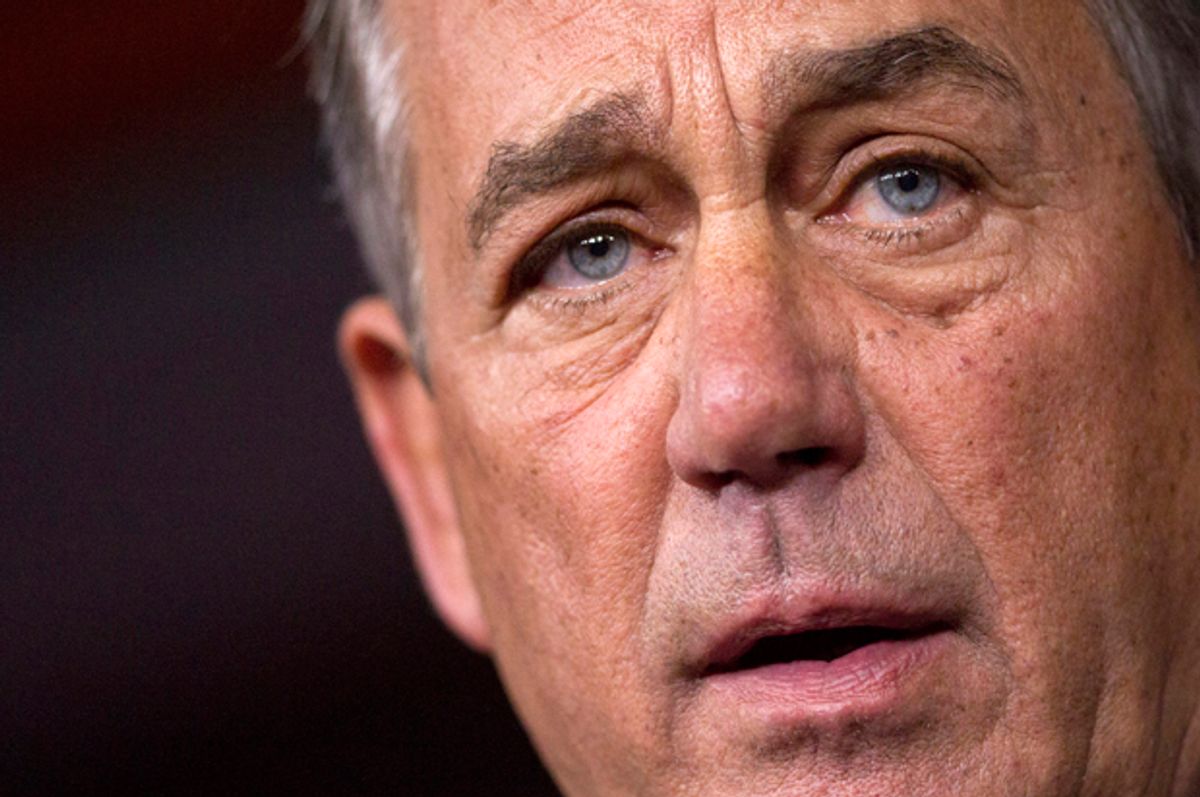If you want to get a sense of just how volatile the internal politics of the House GOP caucus has become since Speaker Boehner’s surprise resignation, think about this: Rep. Jason Chaffetz, the Utah congressman who was recently burnt to a crisp by John Oliver and Jon Huntsman, seems to believe he’s got a shot at holding the speaker’s gavel. This is a guy even conservatives regard as incompetent. That’s how weak the GOP establishment — and its chosen candidate, Rep. Kevin McCarthy — is right now.
But while the disorder among House Republicans is schadenfreude-tastic as far as Democrats are concerned, its implications for the future of U.S. governance are less amusing. Because regardless of whether they’re organized enough to screw in a lightbulb, it is extremely likely that GOPers will control the House at least until the next census. And that, in turn, makes likely that the next president will either be: a Republican who has to mollify zealots in the House; or a Democrat who can only pursue their agenda by straining the boundaries of executive power.
For example, think about the position a hypothetical Speaker McCarthy will probably find himself in upon limping his way into the speakership. As Josh Marshall recently pointed out, McCarthy will be taking the job with an incredibly thin margin for error. He’ll be following Boehner, a historically weak speaker who frequently could not control his own flock; and he’ll immediately have to grapple with a Tea Party contingent that’s feeling its oats after nabbing Boehner’s scalp. And all of this would’ve been true even if McCarthy hadn’t shot himself in the face with his Benghazi/Hillary Clinton gaffe.
So if that’s the speaker that greets the next president, it’s probably going to lead to one of two outcomes, depending on whether the new commander-in-chief is a Republican or Democrat. If it’s a Republican — and, as is likely, one of the establishment ones, such as Sen. Rubio or Jeb Bush — they’re going to have to deal with an insecure speaker who cannot control the House’s Tea Party bloc. And that bloc is going to expect a Republican president to make good on all the promises the party’s made over the years: repealing the Affordable Care Act, defunding Planned Parenthood, eviscerating the safety net and so on.
If that Republican president has interest in supporting any policies that aren’t on Grover Norquist’s wish list, they’ll only be able to do it if they give the far-right some concessions, too. So imagine the same level of magical thinking, pandering and extremism that we’re seeing in the GOP primary, but coming from the Oval Office. And at the risk of belaboring the point, it’s worth emphasizing that this wouldn’t be the price paid for a major initiative — like, say, immigration reform. This would be the cost of simply ensuring the trains run on schedule.
In that scenario, any Republican president interested in winning a second term would likely find it hard to resist executive solutions that allow them to sidestep an ugly fight with Republicans in the House. Certainly, a Speaker McCarthy, knowing that he could only get legislation through with Democratic votes (which could cost him his job among Republicans) would prefer that strategy. And if you think a GOP president would blanche at reforming immigration policy that way after spending years slamming President Obama for doing the same, take a look at how conservatives now feel about killing the filibuster.
So far, we’ve assumed a Republican wins the White House, and the GOP maintains control over Congress. But what would happen if Hillary Clinton (and, yes, it’s going to be Hillary Clinton) was the winner instead? In this case, unlike the Republican hypothetical, there’s no need for speculation. On basically every major issue progressives care about right now — immigration, climate, gun safety, campaign finance, etc. — Clinton is promising to either continue Obama’s executive actions or push them even further. As much as possible, Congress would be frozen out.
I am not much for fretting about executive power (I think Garry Wills is right; that ship sailed decades ago). But there’s still a strong impulse in American politics to regard the expansion of presidential power as regrettable, at best. So whether 2017 marks the beginning of a Marco Rubio or Hillary Clinton presidency doesn’t make a huge difference — the slow transformation of our presidential system into one more akin to a parliamentary one will continue, unabated, either way.


Shares